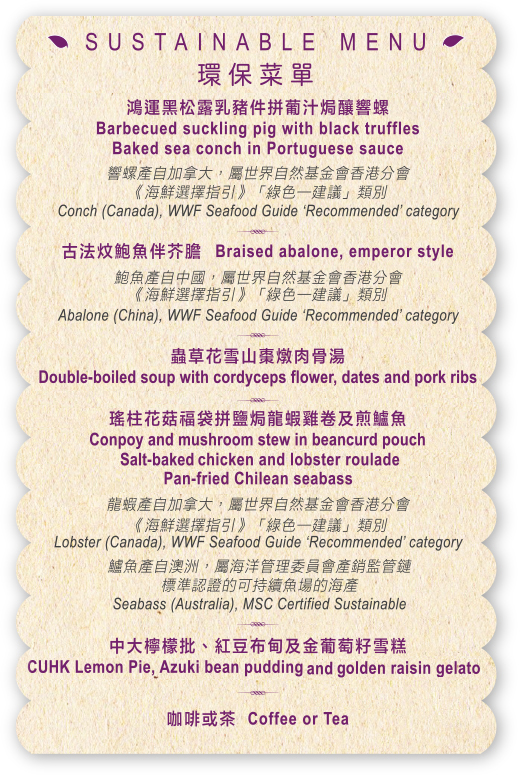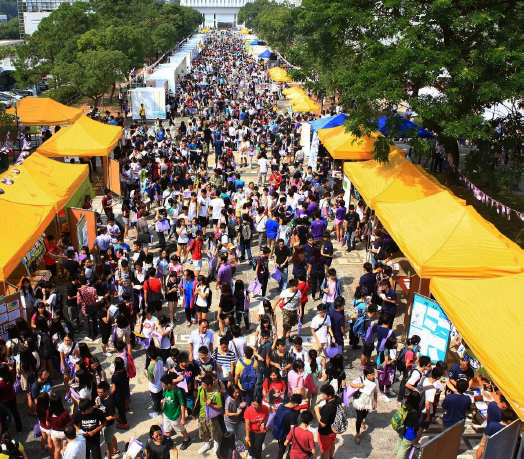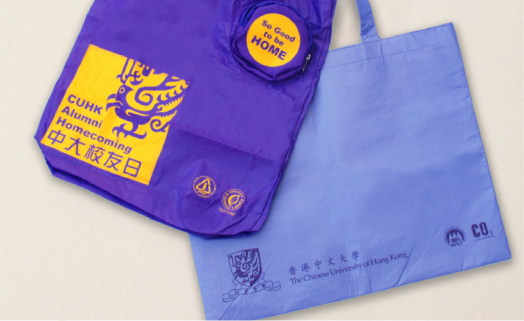A Colourful Feast in Green, and More
Three high-profile events held by the Chinese University in the last quarter of 2013 consciously sought out green options for consumption -- Orientation Day for Undergraduate Admissions (12 October), the Golden Jubilee Alumni Homecoming (7 December), and the 50th Anniversary Banquet (8 December).
A Green Banquet
Over 3,000 students, staff, alumni and friends of the University joined the 50th anniversary banquet, the highlight of the University’s Golden Jubilee celebrations. The event organizer, the 50th Anniversary Celebration Organizing Committee, opted for a sustainable menu. As an increasing number of events in town prefer green catering these days, the caterer was able to propose a menu that takes reference of the World Wildlife Fund’s Seafood Guide 2013, offering only sustainable seafood listed in the guide’s ‘recommended’ category or seafood that have been certified by the Marine Stewardship Council (MSC), an independent non-profit that sets a standard for sustainable fishing worldwide.
To raise diners’ awareness the WWF Seafood Guide and the criteria for sustainable seafood, the menu even comes with information on the origins of the seafood. We’ve all heard the line ‘the way to a man’s heart is through his stomach.’ Perhaps in a similar way, smart planning and a good meal can help pave the way for participants to support sustainability in action!


Planet-friendly Reusable Bags
Bags made of RPET/GPET, a green product made from 100% post-consumer plastic bottles, were distributed to visitors at both the Orientation Day for Undergraduate Admissions and the 2013 Alumni Homecoming, which drew around 65,000 and over 4000 visitors respectively. Seeing that bags are useful for events where visitors tend to pick up a lot of information about the University and need to carry them around campus with them, organizers of the events—the Office of Admissions and Financial Aids and the Alumni Affairs Office—chose to go green in line with the University’s commitment to green purchasing and the Guidelines for Sustainable Event Planning and Management.
RPET/GPET bags are among the best available options in the market because they are made of 100% recycled plastic from PET bottles (most disposable plastic bottles are made of PET), thus providing a useful outlet for waste that would otherwise occupy our landfills. PET bottles are a key component of Hong Kong’s municipal waste: according to government figures, 100 tonnes of PET bottles were sent to the landfill every day in 2011.
Though bags made from recycled plastic are more expensive than conventional ones, the organizers found the practice meaningful as it helps to protect the environment. Also, as a buyer, CUHK’s choice to purchase green supports the development of the recycling industry and the green supply chain as a whole so they can develop better and cheaper products in the long run.
All offices of the University are strongly encouraged to go for the same good green options when distribution of bags is deemed necessary in events. If you do opt for green, remember to make it loud and clear by including the message ‘I’m made of 100% recycled plastic!’




